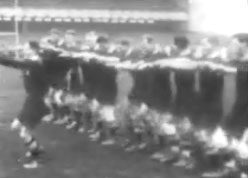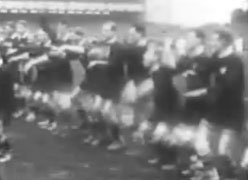|
|
|
Leader
Team
Leader
Team
Leader
Team
|
|
Kia
whakangawari au i a hau!
I au-e! Hei!
Ko Niu Tireni e haruru nei.
Au! Au! Au-e ha! Hei!
Ko Niu Tireni e haruru nei.
Au! Au! Au-e ha! Hei!
A ha-ha!
Ka tu te ihiihi.
Ka tu te wanawana
Ki runga te rangi
E tu iho nei.
Au! Au! Au!
|
|
Get
ready for the clash!
I au-e! Hei!
New Zealand is rumbling here.
Au! Au! Au-e ha! Hei!
New Zealand is rumbling here.
Au! Au! Au-e ha! Hei!
A ha-ha!
Face up to the fear
Fight the terror
To the sky above
Fight up there,
Yeah! Yeah! Yeah! |
Leader
Team |
|
Tena
i Poua!
O rongo Ingarangi,
Hauana i te ao e.
Ah! ha-ha!
Hora hia mai o mahi kia hau
Hora hia mai o Tiima kia hau
O mahi aku mahi me hui |
|
To
you of the Old Country!
The fame of England
has spread all over the world.
Yes! Indeed!
Show us some of this famed
play
Put a few of your famous
teams on display
And let's play each other
in friendship.
|
Leader
Team |
|
Nga
mahi tinihanga me kiki
Au! au! Hei!
Ah! Ha-ha!
Ka mutu nga mahi
Au! Au! Au-e! Ha! |
|
Any
unsporting play we shall kick aside
Yeah!
Yes! Indeed!
When this tour is finished,
come to to Zealand
Yeah! Yeah! Yeah! Ha! |

1.
Ko Niu Tireni e haruru nei
The Haka of the 1924 Tour
Led
by George Nepia and quickly dubbed The Invincibles,
the 1924-25 All Black team played 32 matches in 6
countries and won all games by huge margins.
They had their own haka, written during the voyage
to England by Wiremu Rangi of Gisborne, and polished
up by Judge Acheson, of the Native Land Court. There
were two parts, with the second being omitted in
later games.
The
words of the haka are printed in full in The
Triumphant Tour! : the All Blacks in England,
Ireland and Wales, 1924-1925, a
collection of newspaper reports of each game,
published in 1925. The words there are rather
mangled, like "Katu te ihi i hi" (sic).
The reports of the early games begin with a
description of the playing of the National Anthem
and the "weird war cry of
the visitors." But this rapidly changes
to the "ever-famous war cry
of the visitors."
A
weird chant led by Nepia
The
fifth game at Swansea began with 40,000 waiting
Welshmen singing Cwm Rhondda, Sospan Fach, Land of
My Fathers, and then God save the Queen, which the
All Blacks responded to with a "weird
chant led by Nepia," by which time the
crowd had swelled to almost 50,000. They saw their
home team defeated 39 - 3 in a gruelling game.
The
team had reached the north of England by their
11th game where Yorkshire's 'Football Argus'
dismissively described how "The
Colonials dispensed with their cry and won the
toss" before their team was beaten 42 to
4.
Before the 13th game at Carlisle, "they
lined up in front of the stand and led by a
young Maori, G. Nepia, gave their song and
dance, which was received with loud cheers and
laughter." They
then beat Cumberland 41-nil.
The
Oxford Chronicle's erudite report of their 19th
game tells how "they formed
in a line down the centre of the field with
Nepia a few paces in front of them grinning
broadly and leading them in strange convulsive
movements and the weirdest of weird cries (the
Black Watch sword dancers were not in it)."
A splendid fight, 33 points to 15.
Their
famous war dance
Back
in Wales at Llanelly for game 22, "On
the appearance of the men in red, "Sosban Fach"
was sung with great enthusiasm. Nepia led the
All Blacks in their famous war dance, which was
very impressive. One could almost hear a pin
drop while it was rendered. The crowd again sang
'Sosban Fach' in reply." New Zealand was
lucky to beat the Sospans 8 - 3.
The
report of the 28th and final British Test Match at
Twickenham omits any description of the haka,
instead leading with the sending off of C F
Brownlee seven minutes into the match, for
returning a punch from an English player, giving
fourteen New Zealanders the opportunity beat
fifteen Englishmen 17 - 11, with the aid of a
sympathetic New Zealand line umpire.
Soban
Fach
The
first section of Ko Niu Tireni uses
traditional imagery from Ruaumoko.
This compares the unrestrained creative force of
an erupting volcano with the similar unrestrained
force of human sexuality to create new life. And
in All Black rugby a similar eruptive force is
unleashed (except in World Cup competitions).
It
is of interest that the Llanelly rugby players
used similar imagery in their Sosban Fach
rallying song, with passion expressed by saucepans
boiling over instead of erupting volcanos.
Mae
bys Meri-Ann wedi brifo,
A Dafydd y gwas ddim yn iach.
Mae'r baban yn y crud yn crio,
A'r gath wedi scrapo Joni bach.
Sosban fach yn berwi ar y tan,
Sosban fawr yn berwi ar y llawr,
A'r gath wedi scrapo Joni bach.
Dai bach yn sowldiwr,
Dai bach yn sowldiwr,
Dai bach yn sowldiwr,
A gwt ei grys e mas. |
Mary-Ann
has hurt her finger,
And Dafydd the servant is not well.
The baby in the cradle is crying,
And the cat has scratched little Johnny.
A little saucepan is boiling on the fire,
A big saucepan is boiling on the floor,
And the cat has scratched little Johnny.
Little Dai is a soldier,
Little Dai is a soldier,
Little Dai is a soldier,
And his shirt tail is hanging out. |
Finnegan's
Wake
The Irish novelist James Joyce heard
Ko
Niu Tireni performed
when he watched the All Black game at
Colombes Stadium in Paris on 11 January
1925.
He wrote to his sister Poppie, who was
teaching in New Zealand as a Sister of Mercy
(Sr Gertrude), to ask for the words and
meaning of the haka. She sent him the rather
garbled version that the newspaper had
printed.
|
Kia
whaka ngawari au ia hau.
(Let us prepare ourselves for the
fray.)
I . . . au . . . E . . . Hei . . .
(We are ready.)
Ko niu Tireni e haruru nei.
(The New Zealand storm is about to
break.)
Au . . . au . . . aue . . . ha . . .
hei.
(The sound of the breaking.)
Ko niu Tireni e haruru nei.
(The New Zealand storm waxes
fiercer.)
Team: Au, au, aue, ha hei.
(The height of the storm.)
A . . . haha.
(Now then.)
Katu te ihi i hi.
(We shall stand as children of the
sun.
Katu te wanawana
We shall climb to the heavens in
exaltation of spirit.
Kirunga te rangi
We shall attain the zenith.
E tu iho nei.
The power! The power!)
Au au au.
Tena
ipoua
(Remain alert.)
O Rongo Ingarangi Hauana ite ao e
(The strength of England is known
throughout the world.)
A haha, Hora hia mai o mahi kia hau
(Now then! Let us see what England
can do)
etc...
|
And Joyce
used this modified version of the haka in his
famous 1938 word-play novel Finnegan's
Wake.

|
Holispolis
went to Parkland with mabby and sammy
and sonny and sissy ... all to find the
right place for it ... between wandering
weather and stable wind, vastelend
hosteil-end, neuziel and oltrigger some,
..
Let
us propel us for the frey of the fray!
Us, us, beraddy!
Ko Niutirenis hauru leish! A lala!
Ko Niutirenis haururu laleish! Ala
lala!
The Wullingthund sturm is breaking.
The sound of maormaoring
The Wellingthund sturm waxes
fuer-cilier.
The
whackawhacks of the sturm.
Katu te ihis ihis! Katu te wana wana!
The strength of the rawshorn generand
is known throughout the world.
Let us say if we may what a weeny
wukeleen can do.
Au! Au! Aue! Ha! Heish! A lala!
|
Richard
Corballis gives more details of Joyce's haka
wordplay here.
|
|





